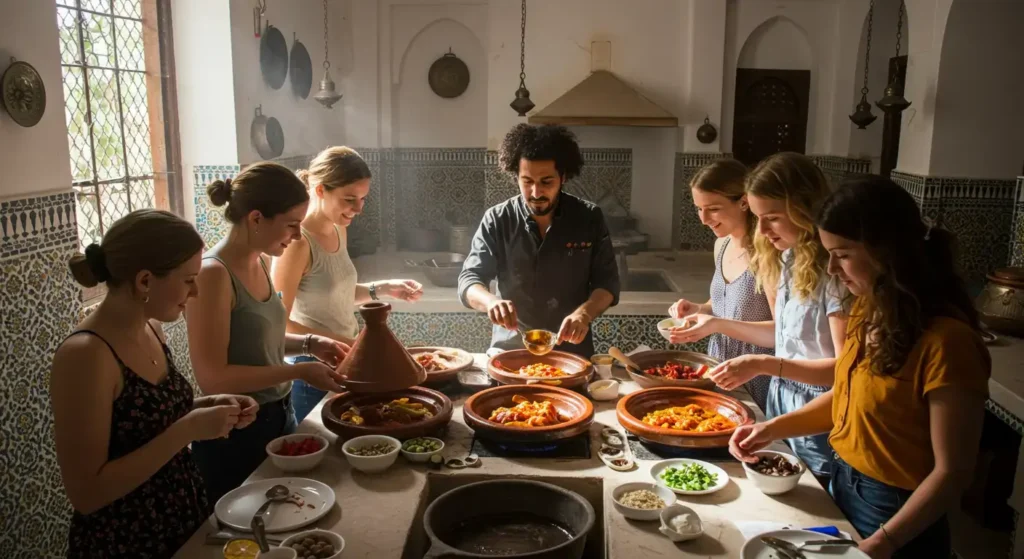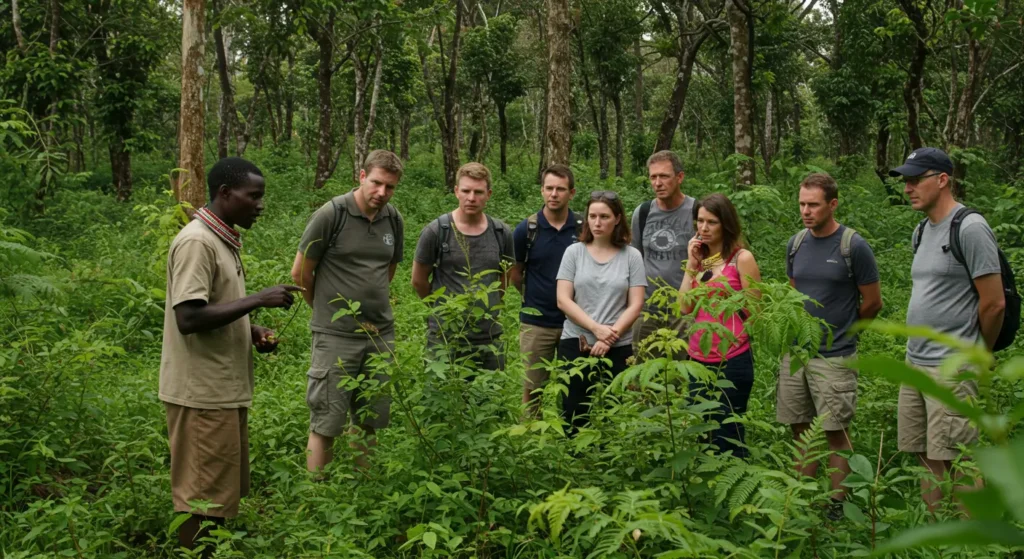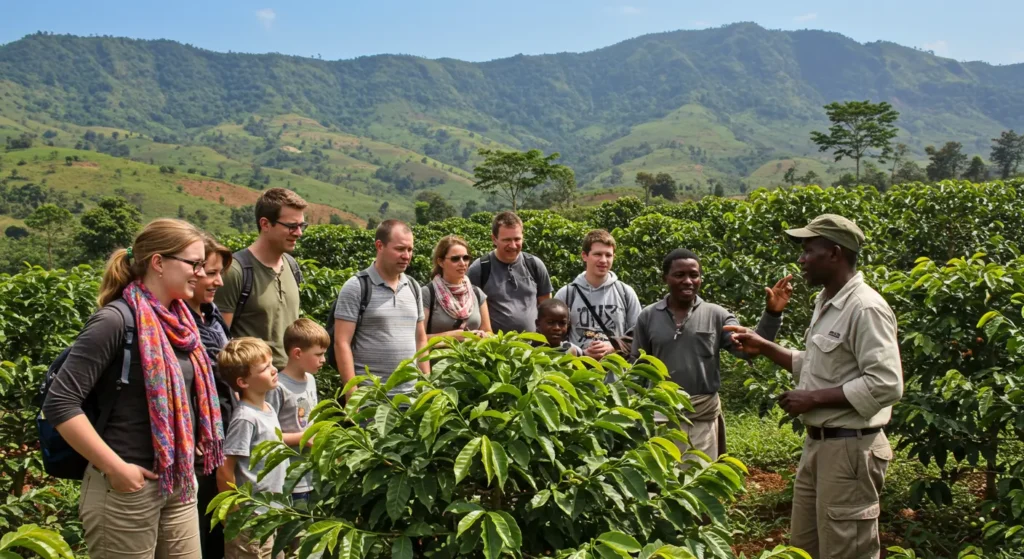Cooking Classes on Farms and the Flavors of the Continent
The scent of sizzling spices drifts over a sunlit field in Ethiopia, where visitors knead fresh injera dough alongside local farmers. In Uganda, a group of travelers gathers around a clay pot, learning to prepare matoke stew with the guidance of village elders. Across Africa from Morocco’s bustling spice markets to South Africa’s rolling vineyards culinary tourism in Africa is emerging as one of the continent’s most flavorful travel trends, blending food, culture and sustainability in unforgettable ways.
This is more than tasting exotic dishes. Travelers are now rolling up their sleeves, harvesting ingredients and cooking alongside locals, turning kitchens into classrooms and food into a cultural bridge.
The Rise of Culinary Tourism in Africa
Culinary tourism, often called “food tourism,” has grown globally into a multi-billion-dollar industry. In Africa, it intersects perfectly with agritourism, wellness travel and cultural immersion. Tourists no longer want to eat in hotels; they want to experience food where it begins on the farm, in the spice garden, or in a traditional village kitchen.

Countries like Morocco, Ethiopia, Kenya, Rwanda, and South Africa are now leading the charge. Visitors participate in farm-to-table experiences, learning recipes, cooking techniques, and the stories behind the dishes. Each dish tells a story: a spice trade route preserved in Moroccan tagine, a healing herb tucked into Ethiopian teas, or a centuries-old stew perfected in Ugandan homes.
From Farm to Table: Hands-On Experiences
In Rwanda’s lush hills, tourists step into small-scale farms where they pick fresh vegetables, herbs, and fruits. “It’s one thing to read about African food,” says Jeanette Niyonkuru, a Rwandan chef guiding cooking classes, “but it’s another to touch, smell, and cook it yourself. That’s what makes culinary tourism transformative.”
In Kenya, farm stays offer immersive experiences: harvesting moringa, picking fresh tomatoes, and learning to cook local favorites such as sukuma wiki or ugali. Guests stay in eco-lodges, enjoy herbal teas, and learn sustainable farming practices. It’s a complete sensory experience, blending wellness, education, and adventure.
In South Africa, culinary tourism extends into vineyards where visitors combine wine tastings with cooking classes focused on local produce. From farm-to-table dinners to wine-infused desserts, the fusion of local cuisine and luxury travel appeals to high-spending tourists.

Cultural Connections Through Food
Food is culture in Africa, and culinary tourism offers a unique window into communities. Travelers don’t just eat—they participate in rituals, learn local etiquette, and hear stories passed down through generations.
In Ethiopia, coffee ceremonies teach visitors about history, hospitality, and preparation methods. In Morocco, cooking classes include visits to spice souks, where tourists learn about centuries-old spice trading routes. These experiences elevate tourism from sightseeing to meaningful cultural exchange.
Economic Impact and Community Empowerment
Culinary tourism also benefits local economies. Farmers, chefs, and artisans gain additional revenue by hosting cooking classes, selling fresh produce, or offering farm stays. In Uganda, local cooperatives run programs where tourists pay for hands-on cooking workshops, providing income for families while preserving culinary traditions.
In Kenya, eco-lodges integrating farm cooking classes have seen bookings increase by 40% in the last three years. Communities benefit not only economically but also socially, as younger generations take pride in sustaining food traditions.
Sustainability and Eco-Friendly Practices
Culinary tourism in Africa is closely tied to sustainability. Farm-to-table experiences reduce food miles and highlight seasonal produce. Tourists learn about organic farming, water conservation, and eco-friendly cooking methods.
For example, a Moroccan cooking class may include harvesting olives, preparing them without chemical additives, and learning traditional preservation techniques. This educates travelers while promoting sustainable practices—ensuring that tourism contributes positively to local environments.

Wellness Travel and Culinary Tourism
Food is at the center of wellness, and culinary tourism naturally overlaps with wellness travel. Fresh, local ingredients, organic farming, and herbal infusions contribute to physical and mental well-being. Tourists leave not only with memories but also with skills, recipes, and knowledge about healthy, sustainable eating.
African culinary tourism offers a holistic wellness experience: yoga in farm fields, herbal teas with breakfast, and cooking classes that emphasize nutrition and natural ingredients. This combination of wellness + food + culture is what makes it appealing to high-CPC audiences searching for luxury and experiential travel.
Highlighted Culinary Destinations in Africa
- Morocco: Spice markets, tagine workshops, and cooking classes in Marrakech and Fes.
- Ethiopia: Coffee ceremonies, injera baking, and farm-to-table experiences around Addis Ababa.
- Kenya: Farm stays with moringa, sukuma wiki, and eco-lodge cooking classes.
- Rwanda: Fresh vegetable harvesting, traditional stews, and immersive farm-to-table meals.
- South Africa: Vineyards offering wine tasting paired with cooking classes using local produce.
Each destination combines hands-on learning, cultural immersion, and sustainable practices, attracting tourists willing to pay for premium experiences.
Challenges and Opportunities
Like any emerging niche, culinary tourism in Africa faces challenges:
- Infrastructure gaps: Some rural areas lack accommodations or reliable transport.
- Marketing: Many authentic experiences are under-promoted internationally.
- Standardization: Ensuring quality and safety without losing authenticity is a delicate balance.
Opportunities lie in partnerships with wellness travel agencies, international culinary tours, and digital marketing campaigns targeting high-spending tourists.
The Future of Culinary Tourism in Africa
Culinary tourism is not just a trend it’s a movement reshaping travel experiences across the continent. By connecting visitors with farmers, chefs, and communities, it turns eating into an adventure, learning, and cultural exchange.
Luxury travelers, wellness enthusiasts, and food lovers alike are seeking authentic, immersive experiences. As Africa invests in culinary tourism infrastructure and promotes farm-to-table experiences, it is positioning itself as a global leader in experiential and wellness travel.
Conclusion
From Ethiopia’s coffee ceremonies to South Africa’s vineyard kitchens, culinary tourism in Africa invites travelers to taste, learn, and connect. Cooking classes on farms aren’t just meals—they’re lessons in culture, sustainability, and community.
As the continent’s food tourism offerings expand, visitors discover that the true flavor of Africa lies not just in its ingredients, but in the stories, traditions, and people behind every dish.





